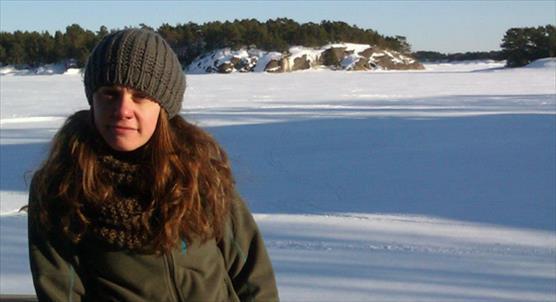Press release 2019-04-09 at 16:39
Global warming changes the composition of phytoplankton communities in marine ecosystems. “In some ecosystems, for example in the Baltic Sea, the composition of phytoplankton communities may shift from diatom predominance towards the dinoflagellate during blooms. This may potentially change the pelagic remineralization of organic matter and reduce the carbon flux to higher trophic levels”, says researcher, M.Sc. María Teresa Camarena Gómez working at the Finnish Environment Institute (SYKE). In her doctoral thesis, which she is due to defend on Wednesday 10th of April at Helsinki University, she has studied how diatoms and dinoflagellates shape the composition and dynamics of the bacterial community in marine ecosystems.
Global warming is one of the most alarming pressures affecting marine ecosystems worldwide. One of the indirect effects of the increasing surface-water temperature is the change in phytoplankton community composition, shifting in some ecosystems from diatom predominance towards the dinoflagellate predominance or co-occurrence with diatoms during blooms.
The phytoplankton groups of diatoms and dinoflagellates vary in the quality and/or quantity of the dissolved organic matter they release. This may have contrasting effects on the structure and function of the associated bacterioplankton communities and also on the carbon flux passing through the microbial loop.

María Teresa Camarena Gómez assessed how diatoms and dinoflagellates shape the composition and dynamics of the bacterial community by conducting both experimental and field studies in the Humboldt Current System off Chile and the Baltic Sea.
The main objective of the thesis was to assess how diatoms and dinoflagellates shape the composition and dynamics of the bacterial community in ecosystems in which either one or both of these two plankton groups dominate the phytoplankton bloom. This was achieved by conducting both experimental and field studies in the Baltic Sea and the Humboldt Current System (HCS) off Chile.
In both ecosystems the composition of the phytoplankton community and the stage of the bloom phase clearly affected to the bacterial community composition and dynamics. Alphaproteobacteria, dominated by SAR11 and Rhodobacteraceae, was the most abundant bacterial class in all studies. The oligotrophic SAR11 dominated in pre-bloom conditions and was associated with dinoflagellates. In contrast, copiotrophic bacteria were associated with diatom species. In addition, in the Baltic Sea, bacterial communities dominated by copiotrophs had higher bacterial production rates than SAR11 dominated bacterial communities. Hence, the dissolved organic matter released by diatoms boosted the development of more productive bacterial communities during phytoplankton blooms. Further differences in the bacterial community composition were driven by the different salinities in these two ecosystems. Betaproteobacteria, Planctomycetes and Actinobacteria were more abundant in the brackish Baltic Sea than in the HCS.
The results of the thesis highlight that the shift to the dinoflagellate dominance or co-occurrence with diatoms may affect the bacterial community composition and activity during bloom events. Certain diatom species promote the growth of copiotrophic bacteria, which contribute largely to high bacterial production rates and recycling of carbon. In contrast, the increase in dinoflagellate abundance associated with global warming may potentially change the pelagic remineralization of organic matter, which could reduce the carbon flux to higher trophic levels.
M.Sc. María Teresa Camarena Gómez from SYKE´s Marine Research Center defends her doctoral dissertation entitled "Diatoms, dinoflagellates and their distinct effects on the structure and function of the bacterioplankton" in the Faculty of Biological and Environmental Sciences, University of Helsinki, on the 10th of April 2019 at 12:00. Professor Jarone Pinhassi from Linnaeus University will serve as the opponent, and Professor Sakari Kuikka as the custos. The event will take place in Viikki campus, Raisio-Sali (Is B2), Latokartanonkaari 7, Faculty of Biological and Environmental Sciences, University of Helsinki.
The thesis will be published in the series: Walter and Andrée de Nottbeck Foundation Scientific Reports.
For more information, contact (in English or Spanish)
Researcher, M.Sc. María Teresa Camarena Gómez
Finnish Environment Institute SYKE, Marine Research Centre
Tel. +358 40 1823 179
E-mail: maria.camarena@ymparisto.fi